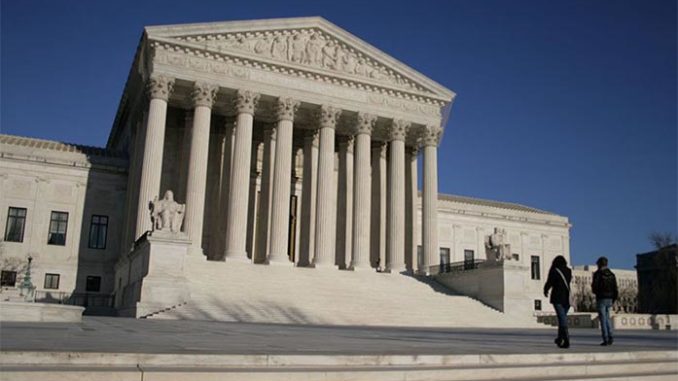
WASHINGTON – The Supreme Court this week moved to take a closer look at Arizona’s bid to deny driver’s licenses to recipients of Deferred Action for Childhood Arrivals, sparking concern among immigration-rights advocates.
The justices Monday asked for the views of the solicitor general – a move that signals the court is considering taking a case – in Arizona’s appeal of lower court rulings that said the state cannot deny the licenses to DACA recipients.
The solicitor general could recommend that the court not take the case, which some advocates were hoping for this week, but the greater chance that this opens the door to another day in court for the state caused some concern.
“We’re students that don’t deserve to be attacked,” said Karina Ruiz, the executive director of the Arizona Dream Act Coalition. “If they give that information to the Supreme Court, then we’re hoping that the Supreme Court would make a decision of not taking the case.”
It was the coalition that sued to block then-Gov. Jan Brewer’s 2012 executive order denying licenses to so-called DREAMers, undocumented immigrants who were brought to the U.S. as children. Those youth can apply for temporary protection from deportation if they meet certain criteria.
DACA recipients can also receive work authorization – a form that the Brewer administration said it would not accept as proof of legal status for driver’s license applicants in Arizona.
The coalition, backed by the American Civil Liberties Union, sued Brewer’s administration on behalf of DREAMers statewide. A federal district judge ordered the driver’s license policy blocked, and that decision was subsequently upheld by the 9th U.S. Circuit Court of Appeals, which refused in February to reconsider its ruling, leading to the appeal to the Supreme Court.
Arizona Attorney General Mark Brnovich, who is pressing the appeal, declined through a spokeswoman Tuesday to comment on the court’s call for the solicitor general’s input on the case.
But advocates who were contacted about the case said they believe the case has dragged on long enough.
“There really is no reason why Arizona can’t back down and follow the lead of the 49 other states in this country and simply provide driver’s licenses to DREAMers,” said Michael Tan, a staff attorney with the ACLU’s Immigrants’ Rights Project. “DACA recipients have been able to drive on Arizona licenses for years now under the injunction with no incidents.”
Ruiz said letting DREAMers drive legally is not hurting anyone.
“It’s just good policy to actually have students and DREAMers out there driving with a license,” she said.
Tan called it “extreme and egregious” that Gov. Doug Ducey would continue to defend his predecessor’s action in court.
Calls to Ducey’s office for comment on the suit were not returned Tuesday.
“There’s really no reason for them to be fighting this case anymore,” Tan said. “DREAMers should be able to drive. Every other state in the country agrees … and there’s no reason that the governor should be trying to take licenses from DREAMers, much less imperil the DACA program.
“If they were inclined to stop, I think we’d be happy to have gone home a while ago,” he said of state officials.
The Supreme Court recessed for the summer Tuesday and will not return until October. An opinion from the solicitor general’s office can take several months to prepare.
The court’s action comes just days after President Donald Trump’s administration announced that it will not seek to reverse the Obama administration’s DACA policy for the time being. Ruiz said she hopes the administration sticks to its word and said that, despite the chance that the driver’s license case could advance, she remains hopeful.
“We think that justice will prevail,” she said.
